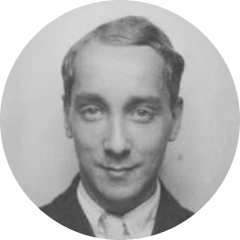Rupert Doone
(1903–66)
Rupert Doone (1903–66), dancer, choreographer, producer – premier danseur of the Ballets Russes – founded the Group Theatre, London, in 1932. See obituary by Tyrone Guthrie and John Moody in The Times, 8 Mar. 1966.
Browne (Making, 38) thought Doone
one of the most intriguing personalities of the theatre of the ’thirties. He came from a Worcestershire family in humble circumstances but with a background which included a link with the Shakespeares and which accounts for his range of intellectual and artistic interests. Leaving home at sixteen he became, through many struggles and privations, a ballet dancer, and finally rose to the most coveted position in that profession – premier danseur in the Diaghileff company. But only for a few weeks: the great impresario died in the same year, 1929.
Doone left the ballet to enter a new field: he went to the Festival Theatre, Cambridge, where Tyrone Guthrie was working with Anmer Hall [Alderson Burrell Horne (1863–1953), theatre manager, producer, actor, proprietor of the Westminster Theatre, 1931–46], to learn acting and production. This was typical of his endlessly questing mind; and there, as before in the ballet, he found natural friendship with the most imaginative artists of the day. From a play-reading circle at Cambridge there developed the Group Theatre.
Within a year the Group had its own rooms on the top floor of a building in Great Newport Street … Its purpose was the synthesis of all the elements of theatre – movement, mime, rhythm, speech and design – the ‘total theatre’ of which we have heard so much since then. Doone associated with himself such artists (then hardly known to fame) as Benjamin Britten, Brian Easdaile, John Piper, Henry Moore. The reputation of his seasons rests on the series of original plays he produced between 1934 and 1939, by such writers as W. H. Auden and Christopher Isherwood, Louis MacNeice, Stephen Spender and, to begin with, T. S. Eliot.
See further Michael J. Sidnell, Dances of Death: The Group Theatre of London in the Thirties (1984).
